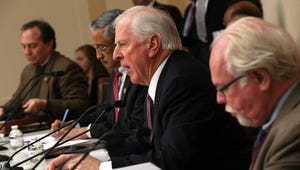In his speech Sunday after last week’s gun massacre in San Bernardino, Calif., President Obama demanded
that Congress “make sure no one on a no-fly list is able to buy a gun.
What could possibly be the argument for allowing a terrorist suspect to
buy a semiautomatic weapon?”
On the surface, the issue
does seem like a no-brainer. Delve deeper than the sound bites, however,
and it's a lot more complicated.
Obama, a former professor of
constitutional law, should know that. Of course allowing a terrorist to
buy a gun is crazy. The real question, though, is whether the no-fly
list is the right tool. Until the federal government cleans up the list
and the process, the answer is no.
The list was an understandable
way to try to prevent more terrorists from getting on planes after 9/11,
but the way it worked should have made Americans deeply uneasy. The
list presumes you’re guilty until proven innocent, which gets one of the
nation’s most important constitutional guarantees exactly backwards.
Last year, a federal judge found
government management of the list unconstitutional, ruling that the way
people get put on the list with no notice, and no meaningful way to get
off if they're on by mistake, violated the Fifth Amendment guarantee of due process. That forced the administration to begin changing things.
As
far as is known, the process remains imprecise. People whose names are
the same as someone on the list have been subject to extra checking at
airports — as the late Sen. Ted Kennedy, D-Mass., learned repeatedly at
airports because there was someone on the list named “T. Kennedy.”
Journalists, entertainers, U.S. military veterans and others have been
wrongly put on the list, or confused for people on it. The ACLU
represented 13 people who claimed they should never have been on the
list, and the government had to admit that at least seven of them should be taken off, and promise to change the process for challenging inclusion.
As
if all this weren’t enough, it’s not even clear what list supporters
are talking about. The government has several. Obama mentioned the
no-fly list, but a House bill doesn’t mention a list at all. Backers say
they expect the attorney general to rely on the FBI’s terrorist watch
list, which includes more than 800,000 people, though about 95% are foreign nationals and can't buy guns anyway.
As
with just about everything else involving guns, the watch-list fight is
dividing along party lines. Last week, the Senate’s Republican majority
rejected legislation to bar gun sales to people on the list. On
Thursday, however, Connecticut Gov. Dannel Malloy, a Democrat, announced that his state would put the ban in place by executive order, a move likely to face legal challenges.
Like it or not, the Supreme Court has ruled that Americans have a Second Amendment right
to buy and own guns, subject to reasonable regulation. Such regulation
should include universal background checks and bans on sales
of military-style assault weapons and high-capacity magazines. But
denying a constitutional right for certain citizens, based on a secret
government list, just doesn’t meet the test of American values.

No comments:
Post a Comment